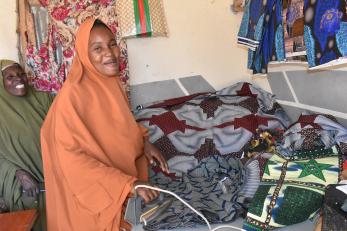A seamstress’ rise to recovery and growth
Women and youth often suffer more from the effects and are more vulnerable to the consequences of insecurity and conflict. Over the last decade, women and girls in Northeastern Nigeria have been facing shocks and stresses ranging from acute malnutrition, sexual violence, exploitation, trauma, high rates of maternal death, and other risks to their health and well-being such as climate-related effects and low participation in economic activities.
In Northeast Nigeria, women also represent a high percentage of the population in poor communities and are highly dependent on small businesses to earn a living and support their families. The market system does not always favor the entry of women-owned businesses, let alone enable those who are running microenterprises to scale.
The Feed the Future Nigeria Rural Resilience Activity (RRA) partnered with Zenith of the Girl Child and Women Initiative Supports (ZEGCAWIS) to develop innovative and inclusive market-driven solutions targeting youth and women-owned enterprises in Borno, Yobe, and Adamawa states. The Activity specifically targeted Micro, Small, and Medium Enterprises (MSMEs) where 3,000 participants were involved in capacity-building interventions that focused on soft skills, entrepreneurship, financial literacy, and business management. Those in craft also benefited from another round of technical skills training.
Through the record keeping knowledge gained, the participants now keep track of their business transactions to be able to make informed decisions around setting prices, knowing their profits, and being deliberate in saving to grow their businesses. This has helped them build the culture of keeping records which is one of the major challenges affecting MSMEs in Northeast Nigeria.
Data gathered by the Rural Resilience Activity shows that business revenues, investments, and jobs created increased when compared to baseline figures. In April 2022, 3,002 participants generated sales worth roughly $291,000, but by September, with improved business practices, and record keeping, sales grew to $431,000 per month for 2,700 participants. Investment-wise, we have seen increases from $330,000 to $862,000, and for jobs created, staff strength has increased from 3,700 to 4,218.
Aisha Garba: Taking it to the next level

Aisha Garba is a mother of two from Nayinawa community in Damaturu, Yobe State. She has always seen the tailoring business, especially in Northeastern Nigeria as a viable business to venture into but was hindered by the over a decade-long conflict that has affected the economy and viability of businesses in her community and the region. In early 2017, as the Northeast began to recover from the shocks and stresses of the conflict, Aisha started her journey to becoming a tailor.
Reflecting on the journey, she said, “I can still remember, in 2017 when the situation around us started to normalize, I needed to start something, and I opted for tailoring. This is because it will not only help me earn a living and support my family but also because I have always had a passion for fashion. So far, this has been my drive. However, for these years, I lacked the capacity to do this correctly. When I met the Rural Resilience Activity through ZEGCAWIS, I knew this was the opportunity I had been waiting for.”
Through life skills, technical skills, financial literacy, business management, and entrepreneurship training, Aisha has taken her business to the next level. She added,
“Because of the business management training, I have learned how to relate more professionally with my clients, how to keep records of income and expenditure, and the need to save and invest; this has taken my sewing business to the next level. I now take my packaging seriously and that has generated positive and satisfactory feedback from my customers. I believe this intervention has played an integral role in expanding my opportunities.
With the digital knowledge gained from the capacity building and technical skill training , Aisha advertises and markets her products via the WhatsApp platform. She has established a working relationship with Gazargamu Store in Damaturu, where they also advertise the clothes she designs, expanding her clientele. While focusing on scaling up her business, Aisha is making plans to expand and update her sewing skills by enrolling in higher courses in Kano.
“For me, my capacity was built, and I have been enlightened to dream big. While l use what I have learned through my engagement with the Rural Resilience Activity, I want to learn new things, and new styles and bring something new to the business environment here. For me to achieve this I will have to go and learn and update my skills in Kano, this will enable me to grow and become better in the business. As you can see, my friend and I are working hard to expand this business.”
Before engaging in the activity, Aisha did not keep records, hence she could not keep track of her income. However, Aisha now has a record of her business. For the past five months, she has averaged 12 dresses in a month with an income of NGN 36,000 as against NGN 22,000.
About the Feed the Future Nigeria Rural Resilience Activity
The Feed the Future Nigeria Rural Resilience Activity is a five-year, US$49 million program funded by the United States Agency for International Development (USAID) to facilitate economic recovery and growth in vulnerable, conflict-affected areas by promoting systemic change in market systems. The Activity is part of the U.S. Government's global hunger and food security initiative. It is aimed at empowering vulnerable households, communities, and systems to cope with current shocks and stresses and to be prepared to withstand future ones.
The Activity is implemented by Mercy Corps, in partnership with the International Fertilizer Development Center (IFDC) and Save the Children (SCI), primarily in the Northeast states of Adamawa, Borno, Gombe, and Yobe. The activity supports smallholder farmers and microenterprises by facilitating their economic recovery and growth and ensures that they move out of chronic vulnerability and poverty through expanded opportunities.